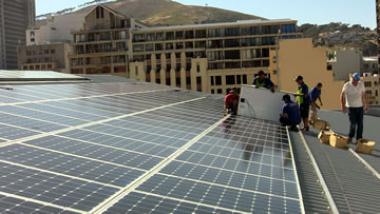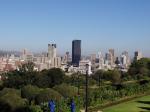R1.5bn solar energy boost for Northern Cape
 In a significant show of support for South African renewable-energy projects, a new R1.5 billion Solar Power Plant, near Kimberly in Northern Cape, is expected to contribute immensely to the country's rising energy demands.
In a significant show of support for South African renewable-energy projects, a new R1.5 billion Solar Power Plant, near Kimberly in Northern Cape, is expected to contribute immensely to the country's rising energy demands.
In a significant show of support for South African renewable-energy projects, a new R1.5 billion Solar Power Plant, near Kimberly in Northern Cape, is expected to contribute immensely to the country's rising energy demands.
According to the Department of Science and Technology (DST), the solar photovoltaic plant, located in Sol Plaatjie Municipality, is one of the first large solar farms in South Africa built by an independent power producer, Droogfontein Solar Power.
Arising from government's Renewable Energy Independent Power Producer Procurement Programme (REIPPP), the plant has been built on a 100-hectare site on which there will be more than 165 000 solar photovoltaic (PV) panels in operation.
The project will supply the Eskom 132 kV gridline and generate 85 458 MW per year. This is sufficient electricity to supply approximately 19 000 average homes each year.
The power generation plant, privately owned by Globeleq, an emerging markets power company and other partners, has signed a 20-year Power Purchase Agreement with Eskom, as well as an Implementation Agreement with the Department of Environmental Affairs (DEA).
The facility has benefited the local community, creating approximately 500 jobs during the peak of its construction.
Delivering the keynote address at the plant's inauguration on Thursday, the Deputy Minister of Science and technology, Michael Masutha, said the DST supports the transition to a low-carbon economy, using cleaner energy solutions in line with the government's vision to reduce carbon emissions and move towards a sustainable energy system.
"Renewable energy holds promise to improve energy security and access, and to solve other socio-economic challenges that South Africa is facing.
"The Department of Science and Technology is focusing on setting up the necessary systems to support the sustainable solar energy industry.
“This is done through supporting research, development and innovation in the energy sector, informing and influencing energy policy decisions, and supporting human capital development," said the deputy minister.
To this end, the department has established and is funding research initiatives at various institutions, such as the Renewable Energy Hub and Spokes Programme hosted at Stellenbosch University, the University of Pretoria, Fort Hare University, the University of KwaZulu-Natal and Nelson Mandela Metropolitan University.
The department also supported the solar energy resource-mapping initiative implemented through the South African Weather Service. It was also finalising the solar energy technology roadmap, in collaboration with the DEA and the International Energy Agency.
"It is foreseen that the DST’s funding and support to renewable energy research and technology development, as well as to human capacity development, will ultimately also benefit initiatives such as the Droogfontein Solar Photovoltaic Plant, providing technical expertise and competence to address the needs of such plants, as well as arriving at new solutions, products and processes to address future solar photovoltaic plants," the deputy minister said.
Mark Pickering, the General Manager of Droogfontein Solar Power, said: "We are proud to be one of the first private power producers established in terms of government's Integrated Resource Plan, which encourages a diverse range of supply technologies to meet the country's future electricity needs, reduce its carbon emissions and make a positive impact on local communities.
“Education and training are vital if we are to unlock the potential of this new industry and best utilise South Africa's abundant solar resources. To this end, Droogfontein Solar Power will be devoting the bulk of its social economic development budget to support education”.

















